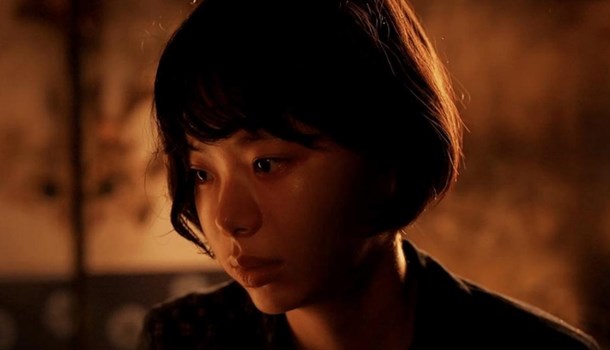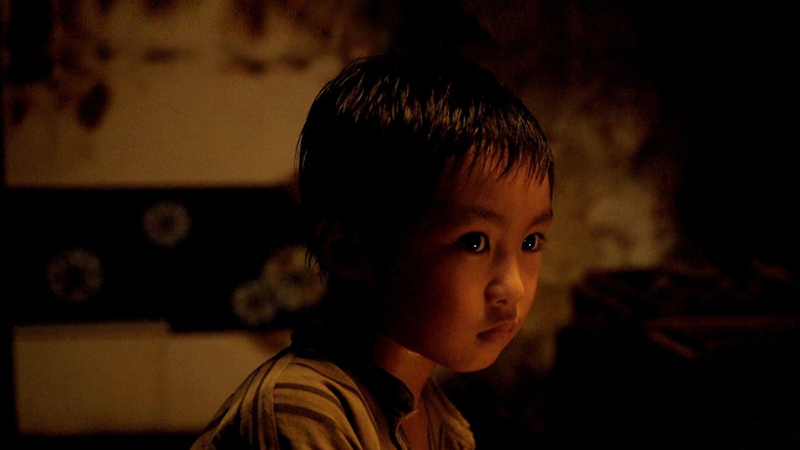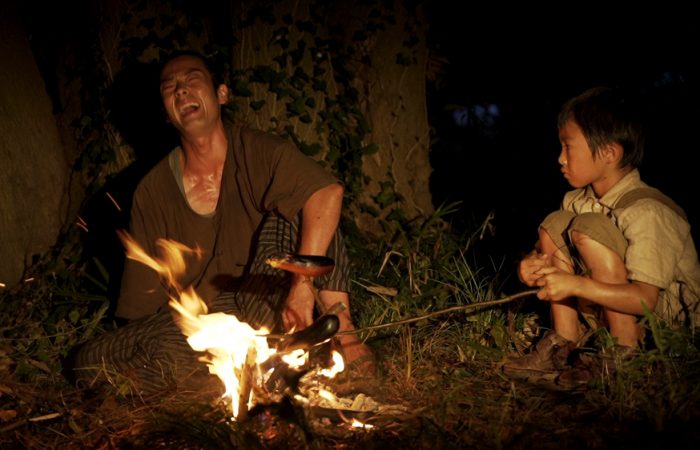
Written by Richard Durrance on 29 Feb 2024
Distributor Third Window • Certificate 15 • Price NA
My ticket to the only London option to see Shinya Tsukamoto’s latest film, Shadow of Fire, was bought pretty much as soon as it became available. I’d not seen one of his films at the cinema on any form of contemporaneous release since Vital (2004). Shadow of Fire was shown as part of the Japan Foundation’s Touring Film Programme and, somehow, I’d never really seen films as part of their efforts despite this being the 21st year of programming. Maybe it's because their films tended to be shown at the ICA in London and my previous experiences there left me avoiding it like the proverbial. But this year I’d at least caught a showing of Keisuke Kinoshita’s 1959 The Snow Flurry (excellent, by the way, and hopefully we’ll get a restored release of it someday) and so twice in a week I braved the ICA, it had to be done for Shadow of Fire. (Though I have to say the seats are bloody uncomfortable, who stole all the padding?)
That said Shadow of Fire is not meant to be comfortable viewing by any standards, telling the story of a Young Woman (Shuri) who lives in a crumbling inner-city inn and is having to prostitute herself to get by. Into her life scrambles a stray dog of a child, a Young Boy (Oga Tsukao) getting through the after-war years by stealing, who then finds himself becoming attached to the stories of several damaged people.
Shadow of Fire breaks down broadly into two parts, the first with the Young Boy and Woman; then the Young Boy following a Man (Mirai Moriyama), into the countryside for purposes that are not at first clear. As you’ll have noticed none of the characters have names, the locations are never made clear and though we are meant to assume the film is taking place immediately after World War 2, we can only infer this by what we see. Tsukamoto has said this is intentional, to make the situation, what we witness, universal. I remember doing the same thing when writing a screenplay as part of my university degree where two people meet in a city that is being bombed to pieces, the war, the place, nothing is explained, it doesn’t need to be because it’s about the impact of war. Shadow of Fire is about living in the shadow, the after-effects, of war. It does so with power but always with understated humanity. Some of what we see is grim and disturbing, but throughout the film there is both humour and warmth, despite the intensity of what we witness.
The Young Woman is, at first, alone and only visited by her elderly pimp (if you can call him that, because it seems more nuanced but also as simple a relationship as that – something that is indicative of how the film works – procurer might be a better word than pimp), who brings her sake and sends men to sleep with her for his cut of the money, and sometimes he comes for sex, but seems otherwise benign, just another person trying to find a way to get by (he only sends men that are not weird, as best he can judge, he tells us). Then the Young Boy and a Young Solider (Hiroki Kono) inveigle their way into her life, so that for a few days they become a makeshift family, until the Young Soldier’s damaged state becomes suddenly, startlingly clear (the woman behind me at one point was audibly horrified) but Tsukamoto you feel wants us to not see this as just a damaged, potentially dangerous Young Solider, which he is, but also as a human being that has been terribly harmed by war and not given a way to be healed. The Young Woman cannot help him, not in the way he needs, and certainly not with the Young Boy there. Yet for a time there are some lovely, beautifully detailed scenes, where we see the innocence of who the Young Soldier once was, an element of which still exists in the shadows, but the extent of his damage is too great, and some of this we only hear about in passing, not as acts of violence, but a state of emptiness, of what we’d now likely consider post-traumatic stress. These moments of pseudo-familial interaction are carefully filmed, performed and reminded me of my big gripe with Godzilla Minus One and how it totally cops out in terms of the two young leads and the child that they look after. Where that film had great potential to tell a complex emotional situation it opts for lazy by the numbers love story. Shadow of Fire shows you how it's done, how to nuance characters and their situation beautifully – this is emotionally impactful writing and knows where to draw the lines. There’s a reason why I still think Tsukamoto is one of the best writer-directors on the planet and moments like demonstrate why.
This first half(ish) takes place within barely two rooms but this is never a constraint. If anything this narrow arena is something that Tsukamoto exploits and one that can at times feel like a safe haven and a battleground. The focus on so few characters means it can examine them in more emotional depth and detail than a more wide-ranging narrative, rather than pay lip service to character development. How he does this is arguably one of those closed space masterclasses because you are hardly aware of the constrained space – you need nothing more. Yes, it is clear, and Tsukamoto is pellucid on this point, that this is in part a budget constraint, but it’s a classic example of making the most of what is available.
As the film then expands, with the Young Boy starting to follow the Man, for reasons that to us seem potentially criminal, develops in a different direction, and Tsukamoto allows it to be a little more picaresque, but this works because there are moments of more overt fun that could be outside the world of a society dealing with the impact of war: the Man fishing with his hands, shouting with pleasure, then flinging the fish to the Young Boy; then in counterpoint we may witness the psychological damage to a son, broken by war even if exactly by what we will never know. We don’t need to know, as Tsukamoto is laying bare the harm before us - often the why is not important and in those moments where it is, it's more a matter of accusation as opposed to pointless exposition.

Watching Shadow of Fire I felt on edge continuously, found myself physically jerking at unexpected sounds and motion (apologies to the women behind me for this, who must have thought I was an absolute loon). The sheer intensity of the film sucks you in, especially the first half, where the burnt, mouldering inn is full of dark depths. Sometimes the mechanics of the film are equally absorbing, such as early on when images of the Young Woman blend together, the editing dissolving images of her one over the other to suggest the blank passing of time and the emotional vacuum temporarily within her, or the sudden cuts accompanied not necessarily by violent action but sharp movement or noise, not to work as jump scares but as jarring impacts, a representation of how the people we see and their lives are long moments of emptiness punctuated by sudden disturbances.
Yet as much as the film can be dark and intense, Tsukamoto always ensures that humanity weaves its way through the narrative; yes, sometimes that humanity may seem brutal (though as an audience we understand what is happening even if the Young Boy may not), but often it shows how we can choose to live our best life. We may have to compromise, do things we would not otherwise believe forgivable, but we have a choice to do our best, to hold on to our essential humanity and finally that is what some of our characters do. The tragedy is that some cannot, being too broken and without hope. Importantly, Tsukamoto leaves us with a vision that is not of a world without hope, but one where quiet acts of humanity occur, but as Tsukamoto has said, the film is a plea to ensure that no one ever has to go through what his characters have to, either in or after times of war.
It’s hard to disagree with Tsukamoto as there is no romance to the film, and visually it is always interesting, as you’d expect, but there are several images that were startling and immediately felt as though they were being seared into my brain, the black and white grid of the destroyed city seen from afar, the later images of broken soldiers laid in dank corners of who knows what destroyed building. The former image especially seemed to exist as a map of destruction but also as a piece of art that might disturb you - without you knowing why - on a gallery wall.
Some of the performances are superb. Shuri as the Young Woman has a role that could be showy, but Shuri tends to underplay it, and we can see in her face, her movements those of a woman worn down by war in all its attended horror. Yet she also comes alive, albeit slowly, when life comes knocking at her door. Shuri is also interesting casting because her appearance is such that she seems quite young, and she is only about 23 in real life, but she has the kind of face that could be that of a teenager, so I found myself early on questioning how old her character was meant to be and how much of her life had been led in such a state. Finally, we understand this a little better, as the Young Woman unfolds as a character.
As for the Young Boy, there is a blankness, often as not, to his character. But this is not the blankness of laziness, as Oga Tsukao gives a truly great performance for a 6 year old. In his blank stare there seems something both so very grown up and also uncomprehending, as we recognise here is a boy that has grown up without being allowed to ever be a child. Often, he says little, yet when in the second half the Young Boy becomes more vocal, Tsukao seems to be the same boy, just coming to life a little, becoming momentarily the child he should be, and also having learnt what it means to live from the Young Woman and even the Young Soldier, in those moments where the Young Soldier is able to show his humanity. It's hard to know how much of the child’s performance is intentional, but it has in it something that so fits the nature of the character of the Young Boy and reflective of the world around him that you feel it should be considered one of the great pieces of child acting; not showy and fully inhabiting the role - what more can any actor hope to do?
Before the film started they screened a short intro from Tsukamoto himself. He ended saying he hoped we’d enjoy the film. It seems an odd wish, because it's a film that in some ways you could argue you could not, and should not, enjoy, being a film that should disturb you, provoke you, make you think. Enjoy the performances yes, enjoy the artistry certainly, can you like such a film in the conventional sense? That’s a tough question, and I think in the end you can say that Shadow of Fire is an extremely skilled and quietly emotional plea for peace shown through the eyes of a child that should not have to live such a life. It’s what a war film should be, one that puts you on edge, makes you uncomfortable, occasionally rewards you with how humanity can shine through but as entertainment I’m not sure. That said, I look forward to watching this when Third Window release it later in the year. I want to see how it resonates, watching at home and alone away from an audience for a more intimate experience. I suspect that intimate intensity might even increase its impact.
My favourite Tsukamoto film is A Snake of June and Shadow of Fire is not going to supplant that, but that is not the point. Here is a film that is beautifully crafted, acted, disturbing and intense. It’s hard to see why more war films need to be made for the most part, what is there left to be said? Tsukamoto here I feel says something new and vital, and by taking away the context, one that anyone with empathy can relate to.


Long-time anime dilettante and general lover of cinema. Obsessive re-watcher of 'stuff'. Has issues with dubs. Will go off on tangents about other things that no one else cares about but is sadly passionate about. (Also, parentheses come as standard.) Looks curiously like Jo Shishido, hamster cheeks and all.
posted by Richard Durrance on 17 Dec 2025
posted by Richard Durrance on 12 Dec 2025
posted by Ross Locksley on 09 Dec 2025
posted by Richard Durrance on 28 Nov 2025
posted by Richard Durrance on 25 Nov 2025
posted by Richard Durrance on 18 Nov 2025
posted by Richard Durrance on 14 Nov 2025
posted by Richard Durrance on 11 Nov 2025